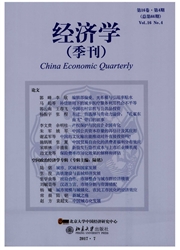

 中文摘要:
中文摘要:
本文通过构建一个考虑双向代际转移的三期世代交替模型讨论了人口老龄化如何影响中国家庭的储蓄、人力资本投资决策与经济增长,并对当前的生育政策调整的经济影响进行了模拟与政策评价。本文的研究发现:在当今中国的现实参数下,人口老龄化已经对家庭储蓄、人力资本投资与经济增长产生负面影响;提高向老年一代的代际转移比率不但无法应对人口老龄化,反而会使家庭储蓄率、教育投资率以及经济增长率大幅下降;放松计划生育政策后,如果生育率不出现大幅度反弹,将有利于经济增长。数值模拟还显示,当前的生育政策调整虽然能够在一定程度上减缓但无法根本扭转人口老龄化对经济增长的不利冲击,要应对人口老龄化的挑战,行之有效的办法是提高人力资本的积累速度和人力资本在生产中的效率。
 英文摘要:
英文摘要:
This paper examines how population ageing and family planning policy adjust- ment affect China's household's saving, human capital investment and economic growth in a three period overlapping generation model with bilateral inter-generation transfer and parents' self-interest and altruism motivation. The main findings are as follows: under current reason- able parameters of China's economy, the population aging has negative effect on saving, hu- man capital investment and economic growth; the higher the transfer rate from adult children to old parent, the lower the economic growth rate, household saving rate and education in- vestment rate- relaxing one-child policy will benefit economic growth, if the fertility rate will not rebound to a much high Ievel- Our simulation results also shows that, as the longevity keep rising and the pressure of old-age support is increasing, fertility policy adjustment, although to a certain extent, can slow down the negative impact of population aging on econom- ic growth but cannot fundamentally reverse it. It is extremely important to improve the speed of human capital accumulation and the efficiency of human capital investment for further cop- ing with the challenge of population ageing.
 同期刊论文项目
同期刊论文项目
 同项目期刊论文
同项目期刊论文
 期刊信息
期刊信息
